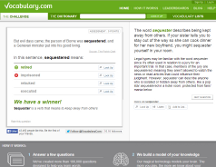Vocabulary.com is a free website that is great for vocabulary development and practice. I think it should be especially helpful for practicing for taking standardized tests because of the unusual connections it sometimes makes between words. For example, learners are challenged to choose the best meaning for the word "mold" from the choices wrest, synthesize, regulate, and endow. "Regulate" is the correct choice. After the student answers (or misses the correct answer), the screen shows that "Mold is a verb that means to shape or influence; give direction to."
Learners can use the system without creating an account or signing in, but signing in (at no cost) allows you to customize your account and lists of words to study. It also allows the program to maintain your account, track student progress, and continually adapt to suit the needs of the learner.
Words are presented with four multiple-choice answers. Learners might be asked to simply choose the word closest in meaning. They might be asked to identify a word that means the opposite, or they might be asked what a word means as used in the sentence provided on the screen. Finally, they might need to fill in a blank with the best word choice.
If a learner misses the correct answer, he or she is given additional chances to select the correct word even though these are still marked as incorrect responses. Incorrect responses elicit a pop-up on the side that explains the word's meaning and usage after the correct answer has finally been selected. This helps students learn the meanings of missed words or clarify why they missed the correct answer.
If learners select the "Challenge" option, the system tracks words that a student misses and adds them to a working list until they are mastered. There are also some word lists that others have already created that can be selected, or you can create your own list.
It seems to me that even the easiest questions use subject matter that is beyond students in the younger grades. While I didn't try this myself, it seems like it should be possible to create your own list that is suitable for younger students. If you want to use the system as it is, I would recommend it for students in about fifth grade and above. It's great for adults too!
One caution: I did find a number of instances where I thought the correct answers were questionable. For example, the opposite of "purge" is "given as "convict" rather than "obtain, liberate," or "retrieve." "Retrieve" seems like a more accurate antonym to me.
The system is speedy, so it's a fairly efficient way to practice vocabulary, especially if you've customized a list. The system scores learners' progress so it feels like a game rather than boring drill.









